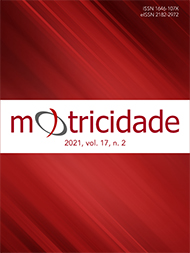Adaptive and psychomotor skills in the quality of life of Mozambique children and youth with developmental disorder: a psychomotor therapy contribution
DOI:
https://doi.org/10.6063/motricidade.20873Keywords:
adaptation, developmental disabilities, independent living, psychomotor therapy, psychomotor programAbstract
The recent Rehabilitation’ paradigm is focused on the provision of individualized supports for a more independent living and a better quality of life. The interest in the measurement of psychomotor intervention effectiveness is growing, but research with children/youth is still scarce. This article aims to analyze the effects of a psychomotor intervention on psychomotor and adaptive skills of six participants from Mozambique, between 6 and 13 years, 2 females and 4 males, with developmental disorders, trying to see its impact in their quality of life. All were institutionalized. Both Portuguese versions of the Adaptive Behavior Scale, Children’s Personal Outcomes Scale, and Psychomotor Battery were applied in three different moments. Wilcoxon test was applied. Baseline results allowed the design of a 4-month psychomotor program adjusted to participants. The final evaluation gave some clues about the effectiveness of the intervention, and the retention assessment provided the analysis of the importance of such intervention. Results of the final evaluation showed significant differences in some adaptive domains, indicating improvements maintained even after the program ended. Body awareness and gross motor skills were the psychomotor domains that increased positively and without changes in retention assessment. These improvements had an impact on quality of life global index. Suggestions to practice and research are presented.
KEYWORDS: adaptation; developmental disabilities; independent living; psychomotor therapy; psychomotor program.
Downloads
Published
Issue
Section
License
The authors of submitted manuscripts must transfer the full copyright to Journal Motricidade / Sílabas Didáticas Editions. Granting copyright permission allows the publication and dissemination of the article in printed or electronic formats, and copyrights start at the moment the manuscript is accepted for publication. It also allows Journal Motricidade to use and commercialise the article in terms of licensing, lending or selling its content to indexation/abstracts databases and other entities.
According to the terms of the Creative Commons licence, authors may reproduce a reasonable number of copies for personal or professional purposes, but without any economic gain. SHERPA/RoMEO allows authors to post a final digital copy (post-printing version) of the article on their websites or on their institutions' scientific repository.


